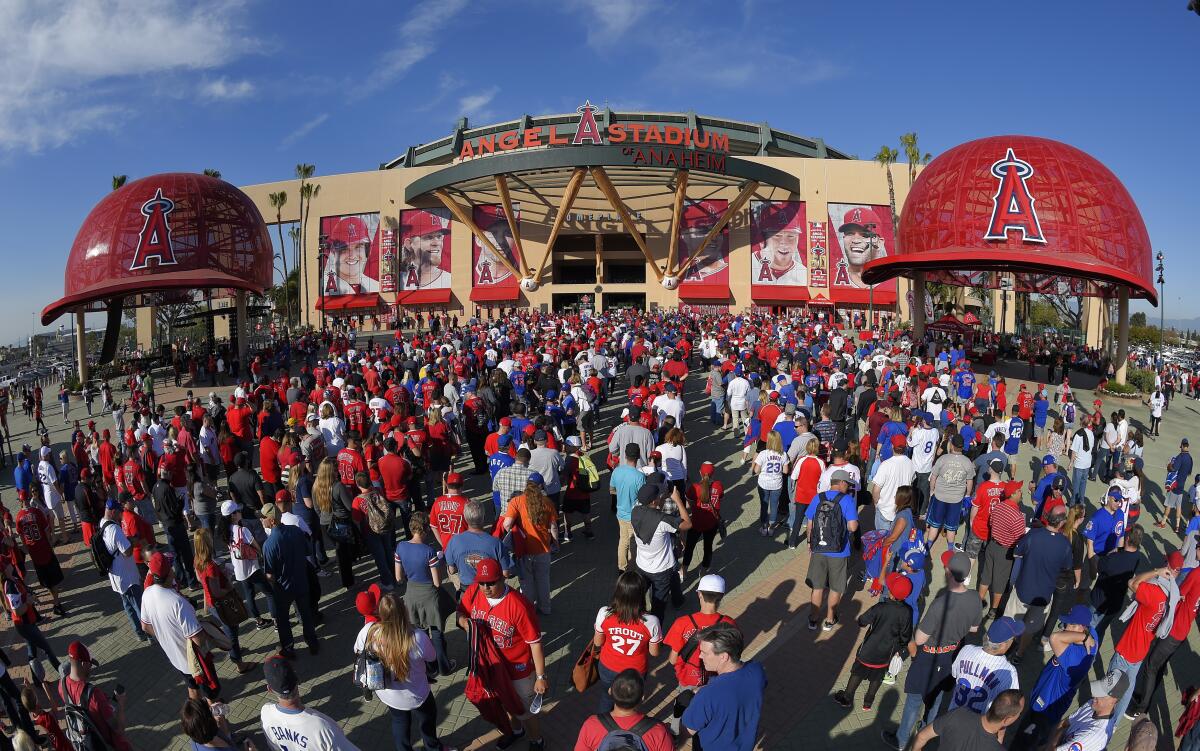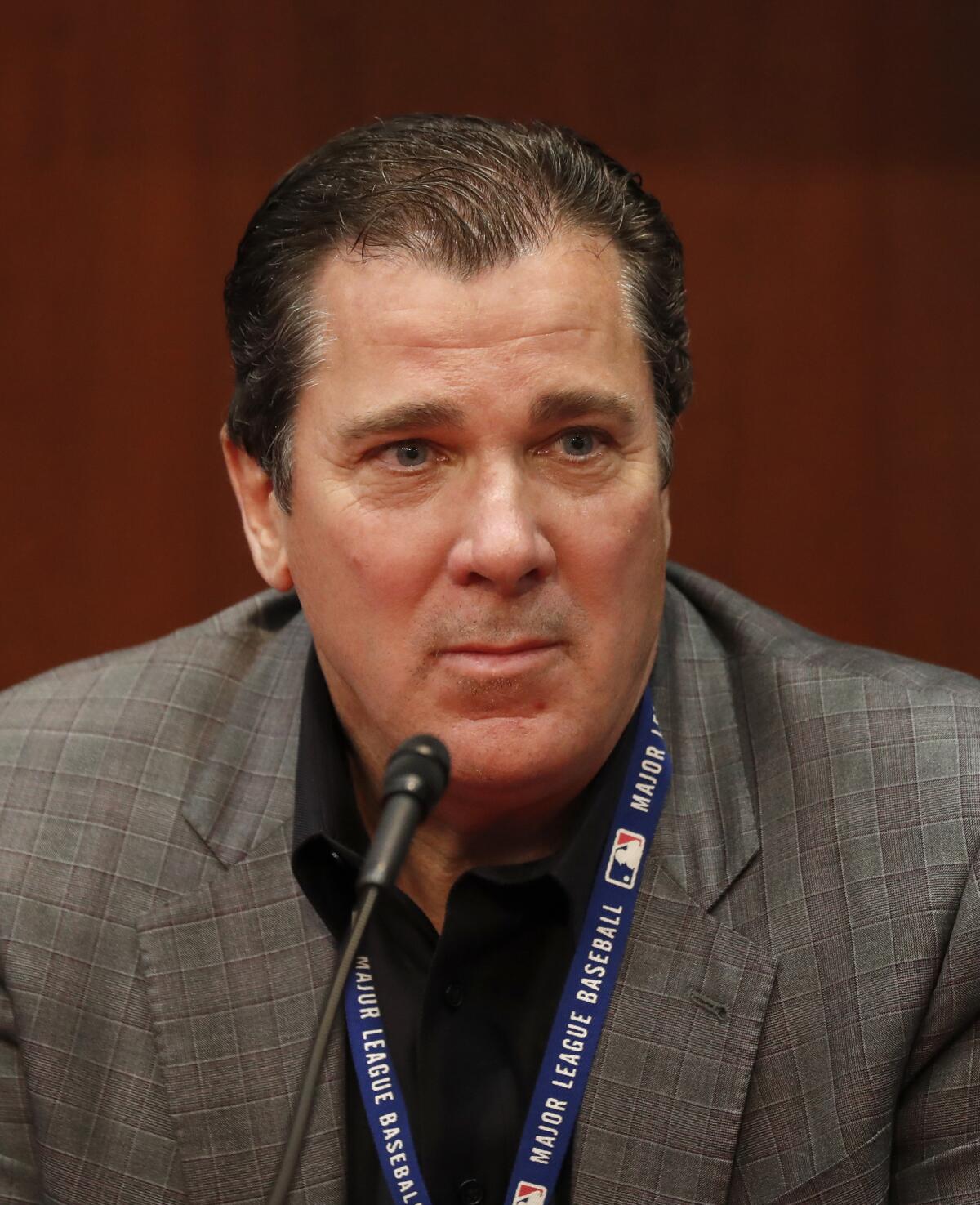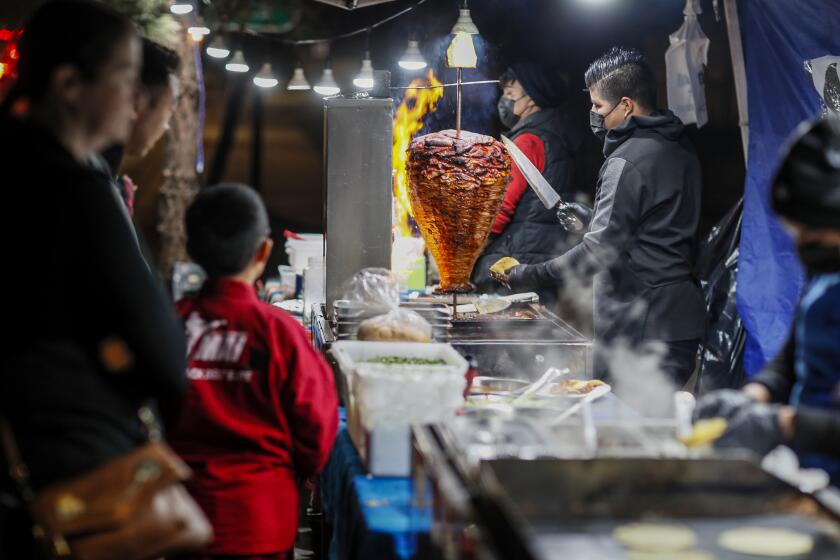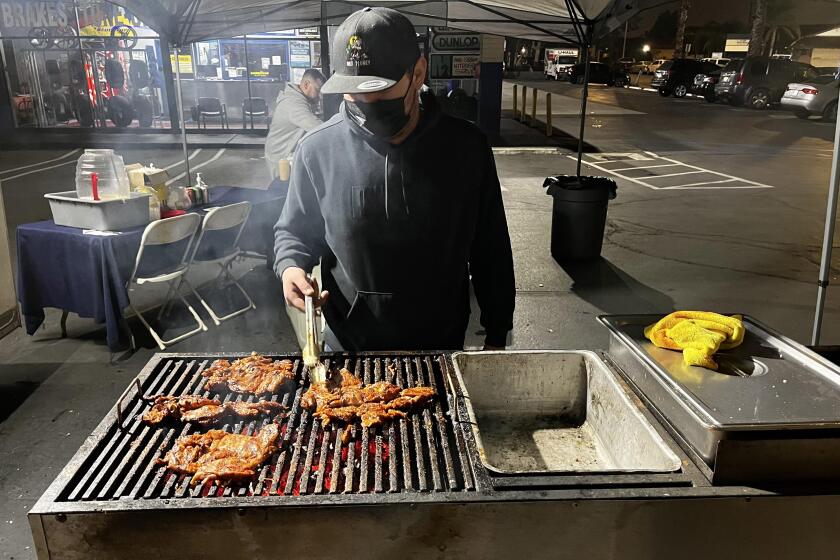Anaheim goes to bat against street hot dog vendors outside Angel Stadium

- Share via
The fragrant smell of bacon-wrapped hot dogs sizzling on push cart grills wafted toward Angel fans on their way out of an April ballgame at the start of the season.
About 40 street hot dog vendors, or “hotdogueros,” set up around the parking lot of Angel Stadium in Anaheim during the opening weekend series against the Boston Red Sox to greet them.
For Angels executives, it wasn’t a welcome sight.
The city-owned parking lot became just another frustrating front in Anaheim’s years-long crackdown on unpermitted street food vendors two months after the Los Angeles City Council voted to eliminate its “no-vending zones,” including outside of Dodger Stadium.
Sometimes employing lookouts, street taco vendors stay a step ahead of Anaheim’s enforcement efforts, frustrating officials and nearby restaurants.
Angels Baseball President John Carpino sounded the alarm to Anaheim and county of Orange officials about the potential price of inaction against street hot dog vendors in an April 8 email obtained by TimesOC.
“Due to the lack of oversight, the possibility of a guest getting severely sick or even dying due to food poisoning is of great concern to us, and hopefully to you as well,” Carpino wrote. “You are the city and county officials which can create and enforce the necessary legislation to keep our residents safe.”
Carpino outlined three major concerns regarding street food vendors in his plea to Anaheim City Manager Jim Vanderpool and then-county chief executive Frank Kim.
He claimed that vendors hampered people with disabilities from having easy access to their cars, caused complaints from fans over food poisoning and obstructed public safety with loud portable speakers.
Leading into opening weekend, a call for shifts went out to the city’s code enforcement officers with stadium assignments slated for 8 p.m., after the completion of city-wide sweeps.
On Friday night, officers were asked to impound equipment. On Saturday night, they would work with county health officers taking the lead on confiscations.
But only one officer volunteered, according to city documents.

By Sunday’s game, hot dog vendors showed up in full force, which prompted Carpino’s urgent email.
“It is important that our guests know that the vendors and more importantly the food they are selling on stadium property is not approved or regulated by County Health Department or city of Anaheim,” said Marie Garvey, spokesperson for Angels Baseball.
Since 2018, cities like Anaheim have had limited enforcement options at their disposal after Gov. Jerry Brown signed legislation decriminalizing street food vending.
Following the pandemic, more entrepreneurs have tried their hand at carne asada capitalism with unpermitted taco stands.
Outside of the Honda Center and Angel Stadium in Anaheim, hotdogueros bank on crowds craving their Sonora-style hot dogs after concerts and ballgames.
In response to complaints from Angel executives, city officials have reorganized their approach to hot dog vendors outside of the stadium with the staff that they have. Code enforcement began with a much more visual presence in the parking lot, but found that vendors would just wheel around to another part of the stadium.
“We now give them an option to leave or risk seeing their equipment be impounded,” said Mike Lyster, an Anaheim spokesman. “That has actually had a more pronounced impact.”
While still an ongoing issue, Lyster claimed the presence of street hot dog vendors outside of Angels games is less than before due to the city’s efforts.
Both street food vendors and concession stands at Angels games are subject to food-borne illness complaints and county health inspections.
The Orange County Health Care Agency, whose officers team with Anaheim code enforcement, broadly warns that salmonella, shigella, vibrio, norovirus and other germs can transmit from commercial food sources, cause serious illness and even potentially death.
“The risk posed by street food vendors is similar to other commercial food vendors,” said Ellen Guevara, a spokeswoman for the O.C. Health Care Agency. “Public health assessment and permitting assures that the vendor has adequate resources and training to keep their customers safe.”
Permitted concession stands inside the stadium routinely pass inspections, according to publicly available documents online.
But in June, a nacho stand at Angel Stadium was inspected following a food poising complaint from two fans alleging that they got sick after eating “Nacho Mama” nachos.
According to documents obtained by TimesOC, a pound of guacamole, two pounds of pico de gallo and 15 packets of sour cream were tossed out after they were found to have been stored above the recommended 41-degree temperature.
The nacho stand corrected the issue and passed reinspection the next day.
A new pilot program impounds equipment of unpermitted sidewalk food vendors in the city.
While Anaheim still looks to play hardball against hotdogueros, L.A. officials have changed their approach.
After the Los Angeles City Council lifted a ban on street vending in “no-vending zones” in February, the city also settled a lawsuit on July 19 that cleared a path for street vendors to reach customers in high-traffic areas without fear of citations or fines while also significantly cutting permitting costs for them.
By contrast, Anaheim City Council granted code enforcement officers greater authority to impound street vendor equipment throughout the city and at its own high-traffic “no vending zones,” like Angel Stadium, where vendors are prohibited from operating two hours before or after events.
Even still, the city put out a request for proposals that closed on July 29 in hopes of contracting support staff for its code officers.
Fontana hired a private contractor for $600,000 to help crack down on street food vendors as an early pioneer of the approach.
A potential contract in Anaheim is expected to go before council members sometime in the fall after the Angels wrap up another season.
Willdan is one company that has submitted a proposal. In December 2023, former Anaheim Mayor Curt Pringle lobbied on their behalf in seeking meetings with key city staff.
Pringle noted that Al Brady, a former Anaheim code enforcement supervisor, would lead the proposed effort.
All the latest on Orange County from Orange County.
Get our free TimesOC newsletter.
You may occasionally receive promotional content from the Daily Pilot.








